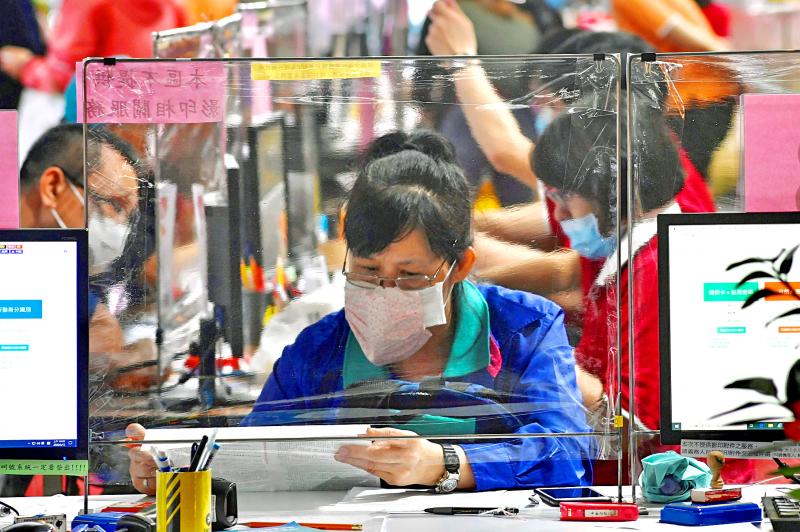The Ministry of Finance yesterday said it collected NT$119.1 billion (US$3.98 billion) in tax revenue last month, an increase of 6.1 percent from a year earlier, bolstered by larger securities transactions and dividend payouts.
The overall gains in tax revenue came even though business activity and housing deals slackened amid the COVID-19 pandemic.
“Trading on the local bourse is vibrant this year, allowing securities transaction tax revenue to post growth for seven months straight,” Department of Statistics Deputy Director-General Chen Yu-feng (陳玉豐) said.

Photo: AFP / Sam Yeh
Stock transactions generated NT$9.4 billion in tax revenue, jumping 12.5 percent from a year earlier, with average daily turnover rising 21.19 percent from NT$155.2 billion to NT$186.4 billion last month, Chen said.
Like other stock markets worldwide, Taiwanese equity markets have seen wild swings, but reclaimed most of their losses to the COVID-19 outbreak, as local tech firms have benefited from remote working and learning arrangements, which boosted demand for laptops, tablets and information technology devices.
For the first four months of this year, stock transactions rose to a new high since the global financial crisis in 2009, Chen said.
Personal income tax revenue surged 49.5 percent to NT$29.3 billion last month, attributable primarily to the quarterly distribution of cash dividends by Taiwan Semiconductor Manufacturing Co (台積電), the world’s largest contract chipmaker.
The ministry has voiced misgivings about the continued upturn in income tax revenue, as it has pushed back the deadline by one month for personal income tax filings this year from May 31 to June 30.
It would be better to make a final judgement after the dust settles, Chen said.
His warning came after corporate income tax revenue and business tax revenue both slipped into negative territory.
Chen pinned the blame on diminished economic activity and an oil price rout, which wreaked havoc on duties from imports of oil, chemical and mineral products.
Business tax revenue might fare worse this month, which reflects partial data for last month, Chen said.
The virus outbreak also weighed on property transactions. Revenue from land value increase tax last month declined 10.7 percent to NT$7.5 billion, with the number of deals shrinking 5.6 percent to 46,545, the ministry said in a report.
Cumulative property transactions totaled 187,121 cases from January to last month, falling 3.4 percent from the same period last year, it said.
However, liquor and tobacco tax revenue held firm with a 6.8 percent increase to NT$5.6 billion, despite a decline in dinner gatherings.
The ministry collected NT$519.6 billion of tax revenue in the first four months, an increase of 9.2 percent from a year earlier and ahead of its budget schedule by 8.6 percent.

South Korea’s equity benchmark yesterday crossed a new milestone just a month after surpassing the once-unthinkable 5,000 mark as surging global memory demand powers the country’s biggest chipmakers. The KOSPI advanced as much as 2.6 percent to a record 6,123, with Samsung Electronics Co and SK Hynix Inc each gaining more than 2 percent. With the benchmark now up 45 percent this year, South Korea’s stock market capitalization has also moved past France’s, following last month’s overtaking of Germany’s. Long overlooked by foreign funds, despite being undervalued, South Korean stocks have now emerged as clear winners in the global market. The so-called “artificial intelligence

NEW IDENTITY: Known for its software, India has expanded into hardware, with its semiconductor industry growing from US$38bn in 2023 to US$45bn to US$50bn India on Saturday inaugurated its first semiconductor assembly and test facility, a milestone in the government’s push to reduce dependence on foreign chipmakers and stake a claim in a sector dominated by China. Indian Prime Minister Narendra Modi opened US firm Micron Technology Inc’s semiconductor assembly, test and packaging unit in his home state of Gujarat, hailing the “dawn of a new era” for India’s technology ambitions. “When young Indians look back in the future, they will see this decade as the turning point in our tech future,” Modi told the event, which was broadcast on his YouTube channel. The plant would convert

‘SEISMIC SHIFT’: The researcher forecast there would be about 1.1 billion mobile shipments this year, down from 1.26 billion the prior year and erasing years of gains The global smartphone market is expected to contract 12.9 percent this year due to the unprecedented memorychip shortage, marking “a crisis like no other,” researcher International Data Corp (IDC) said. The new forecast, a dramatic revision down from earlier estimates, gives the latest accounting of the ongoing memory crunch that is affecting every corner of the electronics industry. The demand for advanced memory to power artificial intelligence (AI) tasks has drained global supply until well into next year and jeopardizes the business model of many smartphone makers. IDC forecast about 1.1 billion mobile shipments this year, down from 1.26 billion the prior

People stand in a Pokemon store in Tokyo on Thursday. One of the world highest-grossing franchises is celebrated its 30th anniversary yesterday.